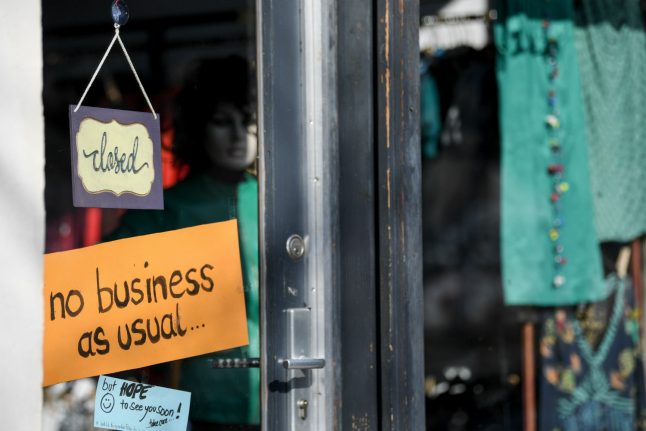The coronavirus pandemic is having massive economic consequences, with many people in Germany and beyond losing their jobs or facing financial difficulties.
In fact, experts estimated on Monday that social distancing measures to contain the coronavirus outbreak, which include closing non-essential shops and shutting down public life, will slash German 2020 economic output by 2.8 to 5.4 percent before a rebound next year.
“The German economy will shrink significantly in 2020,” the so-called “Wise Men” expert panel (SVR) said, with the exact size of the impact “depending on the extent and duration of health policy measures and the subsequent recovery, reported AFP.
The federal government and Germany's 16 states have vowed to provide cash to people affected.
Here's an overview of how to apply for it if you're a freelancer, self-employed or small business. States may offer different procedures and payments. Please contact your relevant authority for more information.
READ ALSO:
- How can workers and businesses benefit from Germany's new aid package?
- Germany plans €40 billion 'rescue package' for freelancers and small businesses
How do you know if you’re eligible?
You must be registered with a German tax office and carry out work from a German permanent establishment/address or a German management headquarters.
Scope of immediate aid: self-employed people and companies with up to five employees can apply for a non repayable one-off grant of up to €9,000
Companies with up to 10 employees can apply for a grant of up to €15,000. Both sums are valid for three months.
Proof of cash difficulties: The applicant must confirm that he/she has encountered financial difficulties as a result of the coronavirus pandemic. Companies must not have already been in financial difficulties on December 31st 2019.
Application deadline: Applications must be submitted by May 31st 2020 at the latest.
READ ALSO: Buy from The Local's readers – help each other through tough times
What's the application procedure?
The Emergency Aid Programme (das Soforthilfe-Programm) involves a bureaucratic application procedure but aims to ensure a rapid payout.
The information provided in the application must be correct – false information may constitute fraud and lead to criminal prosecution. Applications can soon be submitted electronically to the responsible contacts in the state where you live.
It's important to note that you must submit your applications to the competent authority in your federal state.
Here's an overview of where to apply and who to contact for more information.
READ ALSO: Bundestag approves historic coronavirus rescue package
BADEN-WÜRTTEMBERG:
Application to and preliminary assessment by Industrie und Handelskammern (IHK) and Handwerkskammern (HWK), approval through L-Bank. For more information and to apply, visit this site.
BAVARIA:
Moderated by district governments and the City of Munich. For more information and to apply, visit this site.
BERLIN:
Investitionsbank Berlin (IBB). For more information and to apply, visit this site.
BRANDENBURG:
Investitionsbank des Landes Brandenburg (ILB). For more information and to apply, visit this site.
BREMEN:
BAB Bremer Aufbau Bank BIS Bremerhavener Gesellschaft for Investment Promotion and Urban Development mbH. For more information and to apply, visit this site.
HAMBURG:
Hamburg Investment and Development Bank (IFB Hamburg). For more information and to apply, visit this site.
HESSE:
Kassel Regional Council. For more information and to apply, visit this site.
MECKLENBURG-WESTERN POMERANIA:
Mecklenburg-Western Pomerania State Development Institute (LFI-MV). For more information and to apply, visit this site.
LOWER SAXONY:
Lower Saxony Investment and Development Bank – NBank. For more information and to apply click here.
NORTH RHINE-WESTPHALIA:
District governments of Arnsberg, Detmold, Düsseldorf, Cologne, Münster. For more information and to apply, visit this site.
RHINELAND-PALATINATE:
Investment and Structural Bank RP (ISB). For more information and to apply, visit this site.
SAARLAND:
Saarland Ministry of Economics, Labor, Energy and Transport. For more information and to apply, visit this site.
SAXONY:
Saxon Reconstruction Bank – Development Bank (SAB). For more information and to apply, visit this site.
SAXONY-ANHALT:
Saxony-Anhalt Investment Bank. For more information and to apply, visit this site.
SCHLESWIG-HOLSTEIN:
Investitionsbank Schleswig-Holstein (IB.SH). For more information and to apply, visit this site.
THURINGIA:
Thuringia Reconstruction Bank. The acceptance of applications and preliminary tests are also carried out by the IHKn and HWKn. For more information and to apply, visit this site.



 Please whitelist us to continue reading.
Please whitelist us to continue reading.
Member comments